|
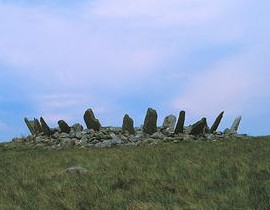 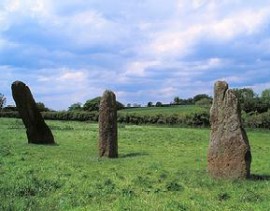 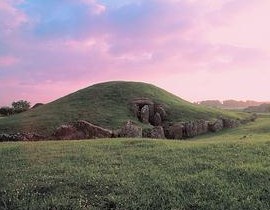 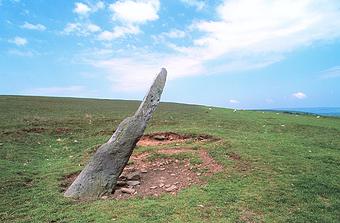 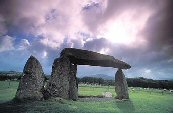 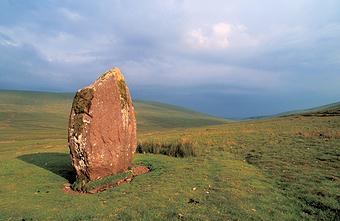
 Prehistoric Wales:
Prehistoric Wales:
Wales is home to the Preseli mountains, which are the source of
both the granite 'Bluestones' and the Green Mica 'Slaughter stone' at
Stonehenge. The unnecessarily
long distance the stones were transported suggests that the stones or region
they came from held an important symbolic
significance in the eyes of the ancients.
Chris Barber noted the significance
of the 'presence of so many Arthurian sites near to
Gors Fawr... Arthur may be considered
as Arth Fawr, the Great Bear and a representation of the Polar force'
(3). He also made the connection that the dolmens of Wales tend to be
sighted on the Great bear, and that the region of Gors Fawr is the
same one that the famous bluestones of Stonehenge originated.
|
Featured Welsh Locations: |
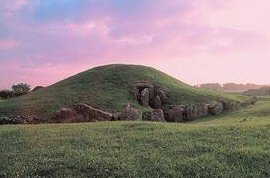 Brynn Celli Ddu
- Passage-mound. Brynn Celli Ddu
- Passage-mound.
This beautiful Kerbed passage-mound
was designed and executed so as to measure the solar year with the
deliberate positioning of an independent standing-stone inside the
chamber, upon which markings can be seen which coincide with the light of the
passing sun
over the stone at relevant times of the solar year.
The passage is
orientated towards the rising summer-solstice
sun. (More
about Bryn Celli Ddu) |
|
Whiteleaved Oak - Apart from being at the geographic junction of three
county borders (Hereford,
Gloucester and Worcester), the proposed centre of John Michell's
'Great Decagon', and therefore, a hub for Britain's ancient 'Perpetual
Choirs' and sitting almost exactly on the 52nd latitude, the importance of
this seemingly invisible village is only now seen in its name.
Whiteleaved Oak was suggested by John Michell to be the exact centre of
a huge geometric alignment of ancient sites he called the 'Great Decagon'
which includes both
Glastonbury and
Stonehenge. These three sites
(at least), are accurately aligned to within 1/1000th part tolerance, suggesting
the outline of a decagon in its completed form, and supporting the idea of an extended prehistoric
landscape, connected by geometrically aligned 'sacred' monuments.
( Click here
for more about geometric alignments)
(More about the 'Great Decagon')
(More about Whiteleaved Oak)
|
|
Gors Fawr (Carn Menyn): Stone-circle, Sacred
Landscape, location of the Stonehenge 'Bluestones'.
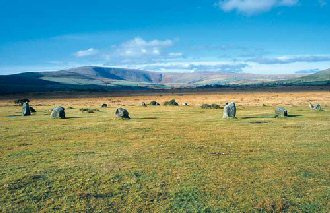 The Gors Fawr
stone-circle is one of Wales best preserved stone circles, it is a
part of the prehistoric 'sacred' Neolithic landscape focusing on the
prominent
Carn Menyn natural outcrop of blue-spotted dolerite granite
in the Preseli mountains, from which over 80 were transported to
Stonehenge. The Gors Fawr
stone-circle is one of Wales best preserved stone circles, it is a
part of the prehistoric 'sacred' Neolithic landscape focusing on the
prominent
Carn Menyn natural outcrop of blue-spotted dolerite granite
in the Preseli mountains, from which over 80 were transported to
Stonehenge.
'There is an intriguing aspect
to the Preseli bluestones � a relatively high proportion of them
(perhaps as much as ten percent) have the unusually rare
property of being �musical�. That is, they can ring like a bell
or gong, or resound like a drum, when struck with a small
hammer-stone, instead of the dull clunking sound rock-on-rock
usually makes. That this property has been noted locally down
the generations is shown by the �Maenclochog� (�Ringing stones�)
village place-name in the Preseli area'.
(2)
(More
about Gors Fawr)
|
|
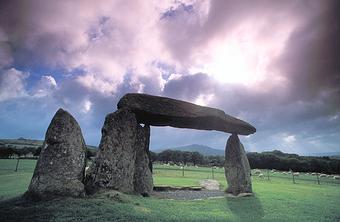 Pentre-Ifan:
The skeletal remains of one of Wales most
visually satisfying monuments. Pentre-Ifan:
The skeletal remains of one of Wales most
visually satisfying monuments.
The estimated 16-ton capstone now only rests delicately on three
tapered stones.
Dating from between
4,000 and 3,500 BC, the outline of the original monument reflects
the silhouette of distant Carn Ingli mountain on the Western
horizon, a feature seen at other British megaliths (see
Orkneys for example).
(More
about Pentre Ifan) |
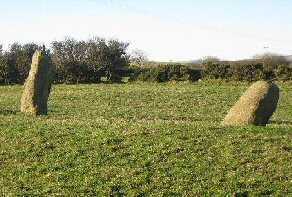 Meini
Gwyr: Unique Welsh 'Henge-circle' (without a ditch). Meini
Gwyr: Unique Welsh 'Henge-circle' (without a ditch).
The sad remains
of this once important Neolithic 'ceremonial' monument are today
down to just two stones.
(More
about Meini gwyr) |
| List
and Description of Featured Welsh Sites: |
|
|